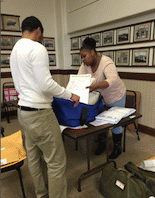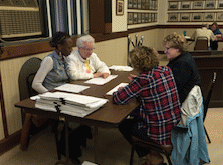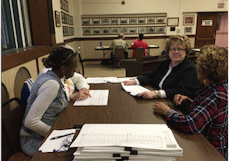| Back OpEd News | |||||||
|
Original Content at https://www.opednews.com/articles/Republican-and-Democrat-Ag-by-Joan-Brunwasser-Ballot-Chain-Of-Custody_Columbia_Election-Integrity_Election-Protection-151230-673.html (Note: You can view every article as one long page if you sign up as an Advocate Member, or higher). |
|||||||
December 30, 2015
Republican and Democrat Agree on This Election Issue? And How!
By Joan Brunwasser
We could end a lot of the acrimony and distrust associated with elections and with our governance if elections were more transparent.Of course every election will have its losers, no matter how the count is conducted. But when losers can see with their own eyes that they truly lost, that the electorate really did vote against them, then they trust the process. Then, they're reassured that democracy is alive and well for them.
::::::::
My guest today is Virginia Martin, Democratic election commissioner of Columbia County, New York. Welcome to OpEdNews, Virginia.
JB: Your county is unique in the state of New York in the way that its votes are counted. Can you tell us about that, please?
VM: Thanks, Joan. Yes, in Columbia County, my Republican counterpart, Jason Nastke, and I have a standing agreement that, going into every election, and for every contested race, we will hand count 100% of the votes cast on our voting machines. New York State Election Law only requires each county to count all the votes on 3% of the voting machines that were deployed, but we don't feel that that's an adequate audit, and so we do more. In reality, though, it's never really 100% of all the votes cast, because, after the unofficial voting-machine results are in on election night, there are some races that we agree just don't warrant more than the 3% NYS audit. The commissioner on the losing side of a race that was anticipated to be fairly lopsided will, at her or his discretion, ask the candidate and the party if they would agree to forego the 100% audit. They always have, with the result that there are quite a few races that we don't do the 100% hand-count on, because there also are generally a number of races with only one candidate. Interestingly, for this election the machine that we randomly drew for the 3% NYS audit is a single-district machine in a town where there are no contested local races.
JB: Let's back up a few steps, Virginia. How long has Columbia County been using this method and how did it come about?
VM: We've been hand-counting ballots since 2010, which is when counties across New York State were required to use optical-scan instead of lever voting machines. I joined the Columbia County Board of Elections, as Democratic Commissioner, in December 2008. At first, I was only superficially aware that new machines would be coming. But as I learned more about those electronic machines, and more about the reliability and safety of lever machines, I, along with my Republican counterpart, joined with an effort across the state to retain the lever machines, which frankly had served us well. Those machines had been designed in the late 1890s to prevent the electoral fraud that was rampant with the existing technology, which was paper-ballot voting. Lever machines were exceedingly reliable, if they were properly maintained and if party officials conducted their legally authorized tests and oversight. Their operations were mechanical and easy to understand. They made machine tampering infeasible, since tampering could only be accomplished by physically adjusting every machine, a risky, time-consuming, and laborious process that was likely to be discovered either during tampering or on election night when completely unexpected and odd-looking vote counts resulted.
The dozen or so county legislatures that had resolved to continue using lever machines did not prevail. The reason was partly because, in 2006, New York State had earned the disapproval of the Justice Department for failing to transition to voting machines that were accessible by the disability community as required by the 2002 federal Help America Vote Act. The issue was further complicated by the state's passage of its own election-improvement law, the 2005 Election Reform and Modernization Act, which mandated electronic machines, which the earlier HAVA law had not done. So the Justice Department sued New York State, requiring it to implement its own law. Thus we could not continue using lever machines. (I and others had argued that lever machines, coupled with ballot-marking devices for those with disabilities, would satisfy HAVA's requirement for access.) Further complicating the issue is that the state had accepted HAVA money for the purchase of new machines, and, indeed, prior to my joining the Board, Columbia County had purchased new machines, utilizing those funds.
I testified before the NYS Assembly's Election Law Committee in 2009, complimenting several of the state's excellent initiatives to comply with HAVA, but asking for reconsideration of the lever machines. In addition to citing the outsized costs of elections run on electronic machines, I outlined the ways that elections could be tampered with. I testified that the 3% audit (of machines deployed) would not satisfy my need to know and understand that electronically produced results were accurate reflections of how the voters voted, and that, if forced to use the electronic machines, I would not certify an election unless all the ballots were counted. That caused quite a stir.
As we neared the 2010 elections, and with my counterpart's knowledge and approval, of course, I consulted with the State Board of Elections, and asked if we could deploy the ballot-marking devices, use paper ballots, and collect them in secure ballot boxes to be hand counted, skipping the scanning step altogether. Our reasoning was that the cost of conducting the election would be considerably diminished since we wouldn't have to test, operationalize, and secure the scanners. I was advised that, given the Justice Department's ruling, the scanners would have to be used, but that hand-counting all the ballots after they were scanned would be acceptable. And so that's what we did, and have done ever since.

Reconciling: process (opening the ballot bag and accounting for all ballots); Republican and Democrat
(Image by Virginia Martin) Details DMCA
JB: I agree with you that electronic voting machines lack most if not all of the safeguards of the lever machines they replaced. How have your constituents reacted to the way votes are counted in Columbia County?
VM: Initially, there was widespread strong support for keeping the lever machines. When we were forced instead to use the scanners to tabulate votes, there was broad understanding that we had to hand count the ballots to see how accurate the machines were. At the same time, there were some who dismissed us as Luddites; they saw our rejection of the state's directive to use a counting system almost exclusively conducted by computer as anachronistic. Many of my Democratic colleagues were not convinced that we were justified in our position. Support was stronger on the other side of the aisle.
Then, after a couple of years passed, and as we saw that the machines were doing a good job of counting the votes (although it was clear that they could not always discern voter intent), there were those who felt that those years represented a "test period," and that we should trust the machines, going forward, and conduct only the much smaller state-required audit. However, my co-commissioner and I recognized that there were a number of reasons why a robust audit is required after every election, so we repeatedly found ourselves explaining those reasons to naysayers.
Yet, as time has passed, more of my constituents are understanding the vulnerabilities of electronic vote-counting, and they are very pleased that their county is distinguished by being so transparent. Every time an election is won (or lost) by one, or a handful, of votes, my constituents recognize anew the importance of knowing for sure that we have fully revealed the vote count, and that it reflects the voters' intentions. They are impressed when in a close race we inform them that one or the other candidate has won a vote that the machine hadn't correctly counted (even if the change doesn't go their way). They certainly never express any distrust in our system. In fact, they are highly trusting of it. That's not to say that everyone likes it, nor can I estimate what percentage of voters like it. But nobody ever accuses the vote counts of being suspect.
JB: I think that's what it's all about, your constituents trusting that the process is going to accurately reflect voter intent, whatever that intent is. So, that's all good. But, is your M.O. only viable in an area or district with a small population? Could it be extrapolated more widely? What are your thoughts on this?
VM: I cannot imagine why what Columbia County does could not be done in a larger jurisdiction. It's just a matter of hiring people who can read and write and count, and then managing the process. People seem to recoil at the notion of hand-counting many thousands of ballots. We've done 30,000 ballots without any particular problem. Why is reading, writing, and counting, and then aggregating that data, thought to be so very difficult? That's the public's opportunity to watch every step and confirm that what we've done is accurate. It costs us a few thousand dollars to count those 30,000 ballots, which is a pretty good deal when you consider that the public then has full confidence in the result. How many government agencies engender that kind of respect and confidence? The process takes a few days to a week. And it puts some local people to work, doing a civic duty and confirming to themselves and their party that the process is on the up and up. I'd much rather pay people to do that work than pay a far-off vendor to sell us a product--made offshore or clear across the country--the internal workings of which are hidden to my view, my counterpart's view, and the public's view. Something that can break down, either visibly or not.
Certainly it would be an undertaking for New York City, for example, to do this. But let's say New York City, with about 100 times the number of voters in Columbia County, has 100 times the resources we do. I fail to understand why they could not make it work with the resources at their disposal when we can make it work with the resources at ours. It's just reading, writing, counting, aggregating, and managing. We can put a [man] on the moon but we can't hand-count voters' ballots?
So it takes a few days to a week to get final numbers. We don't have certifiable numbers until all our absentee ballots have been received, anyway, so there's no holdup in terms of time. We already have a good sense of the election-day voters' choices because the machines provide results on election night, and they have been an excellent predictor of the final results. I don't see where the problem is.

Dems and Repubs monitor one another in hand-counting, GE 2015
(Image by Virginia Martin) Details DMCA
JB: When you put it like that, it makes perfect sense, Virginia. You're very convincing. Too bad you weren't with me when I recently interviewed Barbara Simons of Verified Voting and asked her about the feasibility of using your system where they are [in California]!
VM: I'm interested in knowing why people believe hand counting in a large jurisdiction is not feasible. I'm sure they have their reasons, and they must seem like good ones, but I certainly don't know what they are.
JB: These days, the reality is that elections are often called before the polls have closed, and obviously, before all the votes have been counted. How does that "gotta have it now" mentality fit with making sure each vote is counted, not to mention the hand counting which takes much longer, with results coming in long after the "results" have been announced?
VM: On election night, we're careful to state that any results we post are unofficial. That's because we need to audit the machine results and because we have absentee and affidavit (provisional) ballots yet to count. In larger races, such as federal or statewide, it seems that races are called by the media on election night, presumably because there's a wide margin (that everyone trusts). However, in New York State we don't certify our results until 25 days post-election. I suppose other states have similar requirements.
In terms of our hand-count audit, it's completed, at the latest, one week after the election, and always before we begin counting absentee and affidavit ballots, which begins one to two weeks post-election, depending on whether it's a primary or general election. The audit is not holding anyone up.
It is both frustrating and distressing that the media are increasingly insistent on instantaneous results. After the November 2015 election, we posted our unofficial results, as is typical, an hour and a half after the polls closed, but still our two area newspapers lambasted us for being "slow"--which I found positively incredible. Other countries wait days, weeks, even, for their results. How long do campaigns take? A year, two years. Four years. What's a couple of hours to wait for results? Why the artificial time constraint? Further, I can't fathom why a week would be too long to wait to know precisely what the voters said on election day. An approximation--so far, in our experience, a very good approximation--of their statement is available within hours after the election.
JB: I couldn't agree more. Anything you'd like to add before we wrap this up?
VM: I'm heartened that increasing numbers of voters see the value in hand-counting the ballots. I'm happy to share what we do in Columbia County. Knowing that my county provides a fully transparent count isn't enough. I want to know that other states do, too. How other states are governed, and whom they elect for Congress and the presidency, is of crucial importance to me, as it should be to everyone.
I think also that there's been a shift in just how comfortable people are about having paper ballots to "fall back on if needed." Some who initially felt that the mere existence of those ballots would provide sufficient protection of the vote, because they were "available" for recounting, have come to recognize that it's practically impossible to get a board of elections to permit a public recount of computer-tallied results. As far as I know, no judge in New York State, for example, has ever granted an order for a recount. So, if some people are dissatisfied with the accuracy of the results, their chances of "falling back on" those ballots are slim to none. Which leaves a dissatisfied voting public.
We could end a lot of the acrimony and distrust associated with elections, and with our governance, if elections were more transparent. Of course every election will have its losers, no matter how the count is conducted. But when losers can see with their own eyes that they truly lost, that the electorate really did vote against them, then they trust the process. Then, they're reassured that democracy is alive and well for them.

Switching roles: clockwise from L, front: Dem, Rep, Rep (looking at camera), Dem (in plaid shirt)
(Image by Virginia Martin) Details DMCA
JB: I'm so happy that we had a chance to talk, Virginia. Thanks so much. I hope interest in what you do and how you do it catches on like wildfire!
VM: Likewise, Joan. You're very welcome. It was my pleasure.
***
From Virginia:
Here are a few links, from the Albany Times Union:
http://www.timesunion.com/opinion/article/Hand-count-votes-to-reduce-errors-977654.php
http://www.timesunion.com/local/article/Results-are-in-Voting-machines-approved-by-BOE-556370.php
And here's last summer's Register Star article:
http://www.registerstar.com/news/article_5e9d2a64-2465-11e5-b138-179c54bb2006.html
***
BradBlog interview with Virginia and Jason Nastke, 9/29/2015
County becoming known for hand-counting votes 7/7/2015
Authors Website: http://www.opednews.com/author/author79.html
Authors Bio:
Joan Brunwasser is a co-founder of Citizens for Election Reform (CER) which since 2005 existed for the sole purpose of raising the public awareness of the critical need for election reform. Our goal: to restore fair, accurate, transparent, secure elections where votes are cast in private and counted in public. Because the problems with electronic (computerized) voting systems include a lack of transparency and the ability to accurately check and authenticate the vote cast, these systems can alter election results and therefore are simply antithetical to democratic principles and functioning.
Since the pivotal 2004 Presidential election, Joan has come to see the connection between a broken election system, a dysfunctional, corporate media and a total lack of campaign finance reform. This has led her to enlarge the parameters of her writing to include interviews with whistle-blowers and articulate others who give a view quite different from that presented by the mainstream media. She also turns the spotlight on activists and ordinary folks who are striving to make a difference, to clean up and improve their corner of the world. By focusing on these intrepid individuals, she gives hope and inspiration to those who might otherwise be turned off and alienated. She also interviews people in the arts in all their variations - authors, journalists, filmmakers, actors, playwrights, and artists. Why? The bottom line: without art and inspiration, we lose one of the best parts of ourselves. And we're all in this together. If Joan can keep even one of her fellow citizens going another day, she considers her job well done.
When Joan hit one million page views, OEN Managing Editor, Meryl Ann Butler interviewed her, turning interviewer briefly into interviewee. Read the interview here.
While the news is often quite depressing, Joan nevertheless strives to maintain her mantra: "Grab life now in an exuberant embrace!"
Joan has been Election Integrity Editor for OpEdNews since December, 2005. Her articles also appear at Huffington Post, RepublicMedia.TV and Scoop.co.nz.
